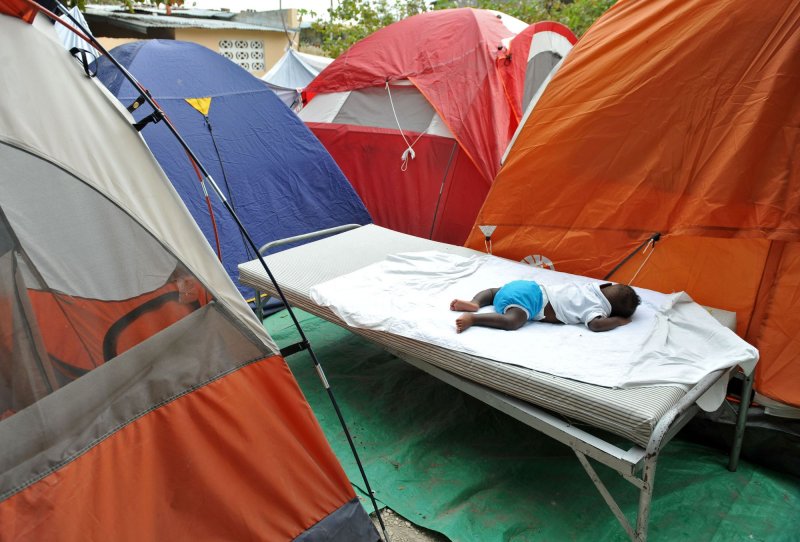1 of 2 | A baby sleeps on a cot in a tent city in Port-au-Prince, Haiti on January 26, 2010. UPI/Kevin Dietsch |
License Photo
PORT-AU-PRINCE, Haiti, Jan. 12 (UPI) -- A half-million people still wait for housing while living in tent cities in Haiti two years after a monster earthquake crushed the country, aide groups say.
But foreign governments, humanitarian groups and Haitians aren't blaming the Jan. 12, 2010, earthquake for the country's woes; they're blaming the government, The Wall Street Journal reported Thursday.
At his inauguration in May, President Michel Martelly said Haiti was "open for business," but his government has been bothered by political set-tos that stalled rebuilding efforts. Parliament didn't approve a prime minister until October, delaying new agricultural projects and refugee relocation programs.
Donor countries such as the United States are losing patience, the Journal said.
"It is not realistic to expect the international community to continue to direct foreign assistance money indefinitely towards this country as it has for so many years," said U.S. Ambassador Kenneth Merten. "[Folks] here have to learn how to stand on their own two feet."
Private charities said they were hampered by Haitian red tape and corruption.
While residents blame the government, the government blames its predecessor.
"We inherited a dysfunctional system, without any transition documents, fraught with obstacles and unmotivated personnel," Prime Minister Garry Conille said during a recent news conference.
The quake killed an estimated 200,000 people and displaced 1.5 million. Non-government organizations tasked with finding ways to build new homes must take into account the needs and desires of the Haitians themselves, which can be challenging, the Canadian Broadcasting Corp. said.
"Things right now are where people hoped they would have been a year ago," Priscilla Phelps, a Washington consultant who was housing adviser to the Interim Haiti Recovery Commission, told the CBC.
When Haitian lawmakers allowed the commission's mandate to expire in October, Phelps was hired by the World Bank for a similar position in the Conille's office.
"I think things are finally getting organized," Phelps said. "There's still a long way to go. There's still not enough funding. I think in terms of how to go about it, I would say that there's been a huge amount of progress."















